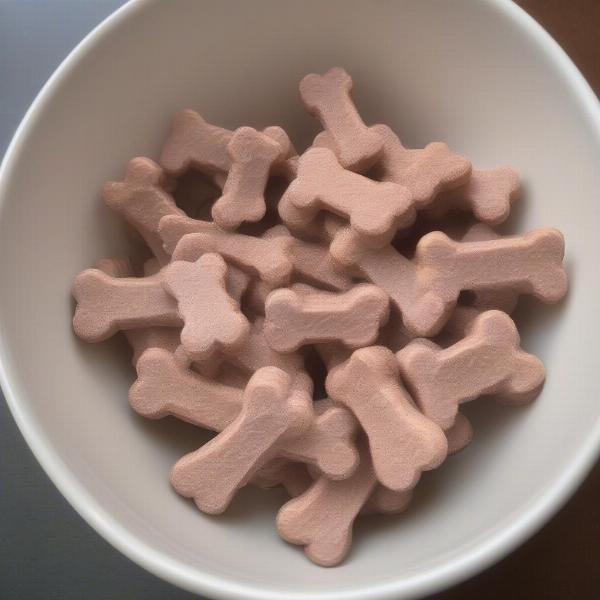Kefir, a fermented milk drink, has gained popularity as a probiotic powerhouse for humans. But can dogs also reap the benefits of this tangy treat? The answer, in most cases, is yes. Kefir can be a valuable addition to a dog’s diet, offering a range of potential health benefits. However, it’s important to understand how to introduce kefir safely and appropriately for your furry friend.
Understanding the Benefits of Kefir for Dogs
Kefir is rich in probiotics, beneficial bacteria that support gut health. These probiotics can help balance the intestinal flora, which is crucial for proper digestion and nutrient absorption. A healthy gut also plays a vital role in boosting the immune system, as a significant portion of a dog’s immune cells reside in the gut.
Digestive Support
For dogs experiencing digestive issues like diarrhea or constipation, kefir can provide relief by restoring the balance of good bacteria in the gut. It can also help soothe inflammation in the digestive tract. Introducing kefir gradually can help minimize any potential digestive upset.
Immune System Boost
The probiotics in kefir can help strengthen a dog’s immune system, making them more resistant to infections and illnesses. A robust immune system is especially important for puppies, senior dogs, and dogs with underlying health conditions.
Improved Lactose Tolerance
While many dogs are lactose intolerant, kefir contains significantly less lactose than regular milk due to the fermentation process. This makes it easier for some dogs to digest. However, always start with small amounts to assess your dog’s individual tolerance.  Kefir poured over dog treats
Kefir poured over dog treats
How to Give Kefir to Your Dog
Start by offering your dog a small amount of plain, unsweetened kefir. Observe for any adverse reactions like vomiting, diarrhea, or excessive gas. If your dog tolerates it well, you can gradually increase the amount. You can mix kefir with their food or offer it as a separate treat. Avoid flavored kefirs, as they often contain added sugars or artificial sweeteners that are not good for dogs.
Choosing the Right Kefir
Look for plain, unsweetened kefir made from cow’s milk or goat’s milk. Organic kefir is often preferred as it ensures the milk comes from animals raised without antibiotics or hormones. You can also find kefir made specifically for pets at some pet stores.
Potential Side Effects
While kefir is generally safe for dogs, some may experience mild side effects like loose stools or gas, especially when first introduced. If your dog experiences any severe reactions, discontinue use and consult your veterinarian.
Kefir and Specific Dog Needs
Puppies and Senior Dogs
Both puppies and senior dogs can benefit from kefir’s probiotic properties. Puppies are developing their immune systems, while senior dogs often have weakened immune function. Kefir can help support their overall health during these crucial life stages.
Dogs with Allergies
If your dog has allergies, especially dairy allergies, introduce kefir with extreme caution. While kefir is lower in lactose, it still contains dairy proteins that could trigger an allergic reaction.
Can Dogs Drink Kefir Every Day?
While kefir can be a healthy addition to a dog’s diet, it’s important not to overdo it. A general guideline is to start with a small amount (1-2 teaspoons) and gradually increase to a maximum of a few tablespoons per day, depending on your dog’s size and tolerance.
Kefir: A Probiotic Boost for Your Canine Companion
Kefir can be a nutritious and beneficial addition to your dog’s diet, supporting digestive health, boosting the immune system, and providing other potential benefits. Remember to introduce it slowly, choose plain and unsweetened varieties, and monitor your dog for any adverse reactions. Always consult with your veterinarian if you have any concerns about adding kefir to your dog’s diet, especially if they have pre-existing health conditions.
FAQ
- Can I give my dog flavored kefir? No, it’s best to avoid flavored kefirs, as they often contain added sugars and artificial sweeteners that are not good for dogs.
- What kind of kefir is best for dogs? Plain, unsweetened kefir made from cow’s milk or goat’s milk is ideal. Organic kefir is often preferred.
- How much kefir can I give my dog? Start with a small amount (1-2 teaspoons) and gradually increase to a few tablespoons per day, depending on your dog’s size and tolerance.
- What if my dog has a negative reaction to kefir? Discontinue use and consult your veterinarian.
- Can puppies drink kefir? Yes, puppies can benefit from kefir, but introduce it slowly and in small amounts.
- Is kefir good for senior dogs? Yes, kefir can support the immune system and digestive health of senior dogs.
- Can I give my dog kefir if they are lactose intolerant? Introduce kefir with caution and in very small amounts, as it still contains some lactose.
Related Articles on ILM Dog
ILM Dog is your trusted resource for comprehensive dog care information, covering everything from breed selection and nutrition to health, training, and grooming. We’re committed to providing evidence-based advice and expert guidance to help dog owners provide the best possible care for their furry companions. Whether you’re a seasoned dog owner or just starting your journey, ILM Dog is here to support you every step of the way. Contact us today with any questions or to learn more about our services. Email: [email protected], Phone: +44 20-3965-8624. For more valuable insights, visit ILM Dog.